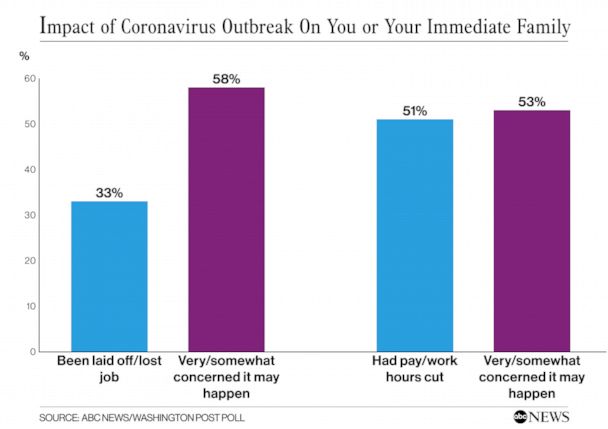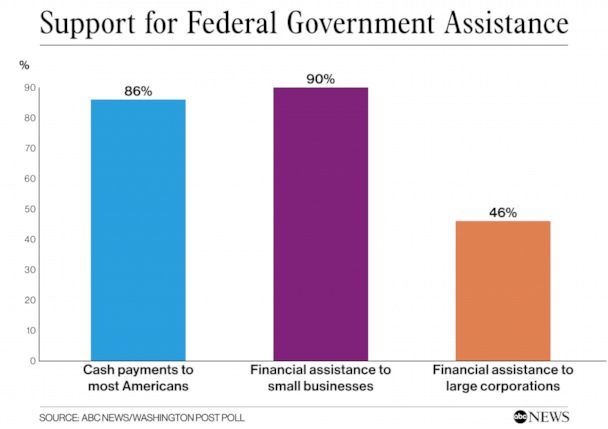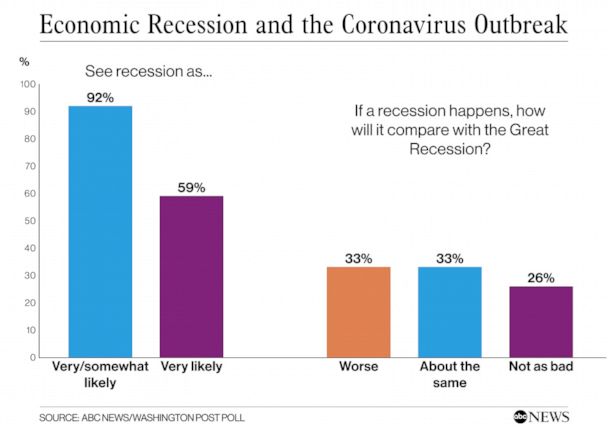A third report a job loss, half a pay cut as coronavirus crisis grips the economy

Economic impacts of the coronavirus crisis are gripping the nation: One in three Americans in an ABC News/Washington Post poll say they or an immediate family member have been laid off or lost their job as a result of the pandemic, and more - half - report a cut in pay or work hours.
Beyond those stark realities, worries for the future are profound. A nearly unanimous 92% expect a recession because of the outbreak, with 59% calling this not just likely, but very likely. If one occurs, two-thirds think it will be as bad as the Great Recession, or worse. Already, in interviews Sunday through Wednesday, 43% say the economic impacts on their own community are severe.
See PDF for full results, charts and tables.
The survey's result on job losses is reflected in the unprecedented level of new unemployment claims reported today by the federal government. But the claims data don't reflect the broader public fears. Among those who haven't yet experienced a job loss in their immediate family, 58% are concerned about it occurring. And 53% are concerned their family will be hit with pay cuts or reduced work hours.
The net totals mean that 71% of Americans either have had a layoff or job loss occur as a result of the pandemic, or are concerned about this; and 76% either have lost pay or work hours, or are concerned that this may happen.
Further, the survey finds higher levels of job losses and pay cuts among the most economically at-risk Americans: those with lower incomes, racial and ethnic minorities and, specifically in terms of job losses, women who lack a four-year college degree.
On another front, the public expresses broad support for some elements of the economic stimulus package approved unanimously by the Senate last night. Eighty-six percent back cash payments to most Americans and 90% support billions in aid to small businesses, with bipartisan views on both. Assistance for large corporations is far less popular, with support dropping to 46%.
Most interviews for this national survey were conducted Sunday and Monday in order to avoid potential call center shutdowns; the results are a portrait in time in the fast-moving crisis. While this report focuses on economic impacts, further results tomorrow morning will look at personal impacts and other issues related to the pandemic. The survey was produced for ABC by Langer Research Associates.
Who's hit?
As noted, economic impacts differ among groups. While 33% of Americans overall say they or someone in their immediate family has been laid off or lost a job as a result of the crisis, it's four in 10 among ethnic and racial minorities (including 41% of Hispanics and 39% among blacks) vs. 29% among whites.
Similarly, among those with household incomes less than $50,000, 39% report a layoff or job loss, compared with 30% of those in the $50,000-$100,000 bracket and 21% of those with incomes of $100,000 or more.
The gender division also is significant, with reports of job losses or layoffs higher among women than men, 37 vs. 28%. That's entirely due to the high level of job loss experiences among women who don't have a college degree, 41%.
Reflecting these demographic differences, the job loss number is lower among Republicans, 25%, than among independents or Democrats, 35 and 34%, respectively.
There also are gaps among these groups - generally not as large - in who's sustained a pay cut or a reduction in work hours. Here the big hit is among younger adults: Among those age 18-29, a broad 66% say they or someone in their immediate family has had their pay or work hours cut. It's 59% among adults in their 30s and 47% among those age 40-64.
Differences are especially profound, moreover, in terms of who's worried about a job loss in their immediate family (excluding those who've already experienced it): Seventy-one percent of racial and ethnic minorities have this worry, vs. 51% of whites; 63% of those with incomes less than $100,000 vs. 43% of those with higher incomes; and 70% among Democrats vs. 44% among Republicans (with independents in the middle in terms of this worry, 59%.) Results in concerns about a pay cut are generally similar.
Further, concern about job loss is higher in harder-hit states, reaching 64% of those in states with 1,000+ diagnosed cases as of Sunday (when interviewing began), declining to 47% among those in states with fewer than 200 cases at that time.
Recession?
Recession fears reflect local impacts. As noted, 43% say the coronavirus already has had a severe economic impact on their community (including 16% who say it's very severe). Those who report a severe economic impact are far more likely than others to see a recession as very likely (71 vs. 47%), and more than twice as likely to think it'll be worse than the Great Recession (47 vs. 22%).
Reports of severe economic impacts of the crisis peak in urban areas, at 51%, declining to 40% in the suburbs and 35% in rural areas. More people in the West reported severe economic impacts at the time of these interviews, 51%, vs. a low of 38% in the Midwest.
There also are political and racial or ethnic divisions on local impacts. Nearly half of Democrats and independents alike report severe economic impacts in their communities, vs. 32% of Republicans; and 51% of racial and ethnic minorities see severe impacts, vs. 39% of whites.
Beyond differing perceptions, this could reflect a difference in the distribution of virus impacts - greater in urban areas, as noted, where more Democrats and minority group members reside - as well as greater economic vulnerability in those groups. Indeed, 44% of Democrats live in one of the states with mandatory business closures at the start of these interviews, compared with 33% of independents and 23% of Republicans.
Methodology
This ABC News/Washington Post poll was conducted by landline and cellular telephone March 22-25, 2020, in English and Spanish, among a random national sample of 1,003 adults. Results have a margin of sampling error of 3.5 points, including the design effect. Partisan divisions are 30-24-37%, Democrats-Republicans-independents.
The survey was produced for ABC News by Langer Research Associates of New York, N.Y., with sampling and data collection by Abt Associates of Rockville, Md. See details on the survey's methodology here.









